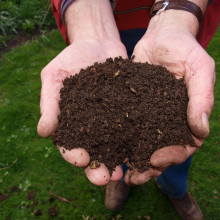Compost or landfill: which emits more CO2?
Listener Robert asks: "does household composting release fewer greenhouse gases compared to a landfill?" Phil Sansom dug him up an answer, with help from environmental engineer Sintana Vergara...
In this episode

00:00 - QotW: Compost vs landfill for CO2 production?
QotW: Compost vs landfill for CO2 production?
This week, Phil Sansom’s been digging up an answer to this question from Robert...
Robert - Does household composting release fewer greenhouse gases compared to a landfill?
Phil - If I’ve got climate change on the brain - as I probably should - then should I be composting my food waste? Environmental engineer Sintana Vergara from Humboldt State University says...
Sintana - Yes, even if you are a novice composter, and have a great landfill nearby. The basic idea is that landfills are anaerobic systems; they are environments without oxygen. Without oxygen, the microbes digesting organic matter such as food waste will release methane, and methane is a very powerful greenhouse gas. Composting, on the other hand, is an aerobic process, and when microbes break down organic matter in the presence of oxygen, they release carbon dioxide - CO2 - rather than methane. While CO2 is also a greenhouse gas, methane is much more potent one, trapping about 30 times more heat than carbon dioxide.
Phil - Bear in mind that your banana peels will degrade more slowly in a landfill relative to a compost pile, so the emissions will be spread over time rather than coming in one short puff. But this doesn’t change the bigger factor that Sintana describes, which that the methane coming from the landfill is much worse than the carbon dioxide from the compost.
Sintana - Now let’s get to the numbers. We are going to be very conservative here and assume a very good landfill, and assume that we are average composters. Based on the U.S. Environmental Protection Agency’s WARM model..
Phil - ...which stands for “waste reduction” model, a free online mathematical tool for exactly these kinds of calculations…
Sintana - ...and assuming a top-of-the-line landfill, in which landfill gas is captured and used to generate electricity, one tonne of food waste deposited there will emit about 470 kg of CO2-equivalents. Let’s compare this with the direct measurement of actual home composting systems from a study published by Anderson et al (2010). They measured that an average of 160 kg CO2-equivalent per tonne of waste was emitted from home composting. That means that food waste thrown in a landfill will emit about three times more carbon than that same waste would if it were composted. And here we’re assuming a best-case landfill and a not-best-case composting system, and not counting any additional carbon benefits from composting, such as enhanced carbon sequestration when that compost is applied to soil.
Sintana - So composting is definitely better than landfilling, even under conservative assumptions. Composting could look even better if the home composting is done well, and if the resulting compost is used to grow plants, which sequester carbon in the soil.
Phil - And plus, as RD pointed out on the forum, no emissions from vehicles transporting your waste if you’re composting at home. Thanks to Sintana Vergara. Next time, a question about the birds and the bees, from listener Jordan...
Jordan - Why do females produce eggs inside the body at body temperature, but males have to produce sperm outside the body at a lower temperature?
Related Content
- Previous America's Choice of President
- Next HIV Under the Microscope










Comments
Add a comment